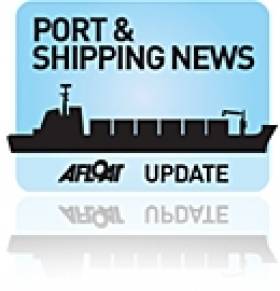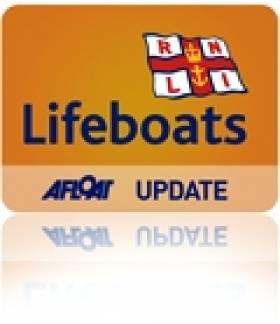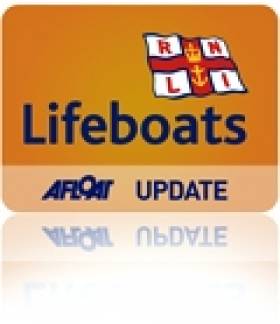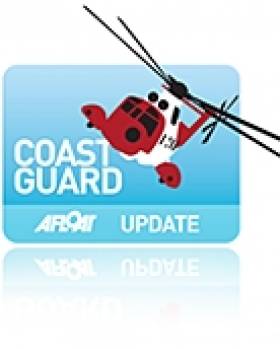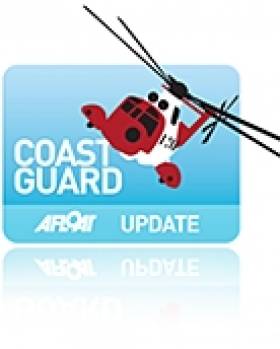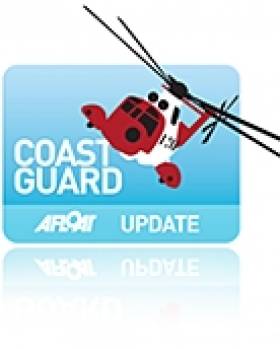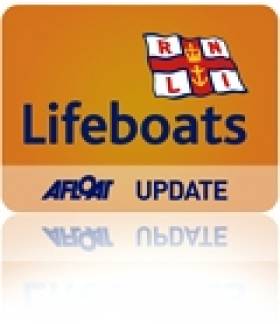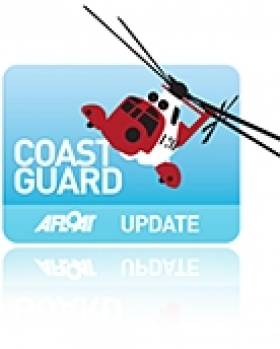Displaying items by tag: Irish Coast Guard
Man and Child Drowned Off West Cork
#News - TheJournal.ie is reporting news of the tragic drowning of a man and a young child off West Cork in the early hours of this morning (6 March).
The bodies of the man and the three-year-old girl were recovered by emergency teams after the Goleen unit of the Irish Coast Guard was tasked to the area following a missing person's report.
Coastguard volunteers found the child on the beach but attempts to resuscitate her were unsuccessful. The body of the man was later discovered in the shallows by the Baltimore RNLI lifeboat.
It's being suspected that the man and the young child entered the water.
TheJournal.ie has more on the story HERE.
Missing 'Ghost Ship' May Have Sunk In Atlantic
#GhostShip - The Irish Coast Guard is on alert after indications that the missing 'ghost ship' MV Lyubov Orlova may have sunk in the Atlantic as it drifted towards Ireland's coast.
RTÉ News reports that an emergency transponder signal on the vessel that only activates on contact with water was picked up by coastguard monitors last week.
No sign of the ship was detected in satellite images of the area some 1,700km west of Valentia where the signal originated, leading to speculation that the ship has sunk.
But the possibility that the signal device was washed overboard cannot be ruled out.
As previously reported on Afloat.ie, the MV Lyubov Orlova was being transported from Canada to the Caribbean for scrapping in late January when it broke free of its tow-line and went adrift in the Atlantic in the general direction of Europe.
With no lights and its Automatic Identification System (AIS) switched off, it could not be located by conventional means - leading the Irish Coast Guard to collaborate with marine surveillance expert Guy Thomas on his new Global Maritime Awareness system in the hopes of detecting the vessel as it approached Irish waters.
The MV Lyubov Orlova is the sister ship of the polar cruiser Clipper Adventurer, the first ever cruise liner to visit Drogheda Port when it entered the mouth of the Boyne last summer.
Kilrush RNLI Rescues Five From Stranded Boat
#RNLI - Kilrush RNLI launched on Thursday afternoon (21 February) after pagers were set off by Valentia Coast Guard to the Foynes area, where it was reported that a boat had lost engine power with five people on board.
Within minutes the crew assembled and set out to the location to investigate. Within 25 minutes they located the vessel and quickly set up a long tow. Tides were running and weather conditions were reaching force 7 to 8.
For their safety the five men were taken on board the lifeboat, while a lifeboat crew member was transferred onto the casualty vessel to oversee the tow. On establishing that the men were fine, the lifeboat proceeded to Tarbert Pier. At this stage the Irish Coast Guard helicopter Rescue 115 from Shannon was also on scene.
Within an hour the Kilrush RNLI lifeboat reached Tarbert Pier, where the lifeboat crew assisted the men in tying up their vessel.
Lifeboat helm Tom Blunnie praised the work of his crewmen in this rescue, stating that “under such conditions it’s great to know that our training pays off when calls like this occur.”
The crew on the day were helm Tom Blunnie, Pauline Dunleavy, Fintan Keating and Charlie Glynn.
Missing 'Ghost Ship' Found 2,400km Off Ireland
#GhostShip - The missing 'ghost ship' MV Lyubov Orlova that has been adrift in the North Atlantic since the end of January has finally been located - some 2,400 off the West of Ireland.
US technology site Gizmodo reports on the discovery via the daily memorandum of the US National Geospatial-Intelligence Agency, which creates maps for top-secret military and civilian use.
It's not clear by what means the vessel was detected, as it has no lights and its Automatic Identification System (AIS) is switched off.
But it may be the result of efforts made by marine surveillance expert Guy Thomas, who has been working in collaboration with the Irish Coast Guard on a new system of marine monitoring called Global Maritime Awareness.
As previously reported on Afloat.ie, Thomas was contacted by Irish Coast Guard director Chris Reynolds amid concerns that the MV Lyubov Orlova might suddenly appear in Irish waters and become a burden on the State.
Responsibility for the vessel has already been disavowed by the Canadian authorities after the vessel, which was being towed from Canada to the Caribbean for scrapping, broke loose from its cabling.
Current information on the ghost ship's position indicates that it is being carried by Atlantic currents towards Europe.
Skerries RNLI Aids Stranded Powerboat
#RNLI - Skerries RNLI went to the assistance of two people whose powerboat got into difficulty off the Balbriggan coast in north Co Dublin yesterday.
Shortly after 6pm last night (Tuesday 19 February) the station’s volunteer lifeboat crew was requested to launch after the alarm was raised by gardaí that a 4-metre speed boat was in difficulty just off Hampton Cove in Balbriggan.
The boat, which was approximately three miles out from Skerries, had fouled its propeller.
Weather conditions at the time were described as cold and dusk was settling into dark.
The Skerries RNLI crew put to sea accompanied in the air by the Irish Coast Guard helicopter, which had been on exercise locally.
Arriving on scene, it became apparent that the two people on board had managed to paddle their boat safely to the shoreline. The Skerries lifeboat crew proceeded to tow the speedboat back safely to Balbriggan Harbour.
Irish Coast Guard Collaborates On New Marine Monitoring System
#Coastguard - The Irish Coast Guard is collaborating on a new system of marine monitoring in the hopes of detecting a dead ship that may threaten to run aground on Ireland's shores.
The Newfoundland Shipping News blog details how the MV Lyubov Orlova, adrift somewhere in the North Atlantic, is being used to test the capabilities of a new system called Global Maritime Awareness.
The system is based on the idea that if the world's top satellite tracking technologies could be banded together, it could establish a much more comprehensive monitoring system for the marine environment.
Marine surveillance expert Guy Thomas, who devised the concept, said he had the idea that if a receiver akin to that used in the Automatic Identification System (AIS) for ship tracking and collision avoidance was put on a satellite in orbit, "you would now have the international identification system for ships that was lacking".
That was done, and a second accompanying system was added that provides radar information from space. The Global Maritime Awareness system combines those with detailed satellite imagery, and Long Range Identification and Tracking {LRIT) technology whereby ships can verify themselves to others and the systems tracking them.
Thomas says these four satellite systems working in tandem make for "a very effective tool in monitoring marine environments for illegal activity".
But it can also be used to prevent potential environmental catastrophes - which is where the MV Lyubov Orlova comes in.
The Irish Coast Guard's director Chris Reynolds contacted Thomas with its concerns that the dead ship might drift into Irish waters and become a burden on the State. Thomas suggested using his system to find it, almost like an ocean-wide version of the game Battleships: even when a ship isn't sending any signals, it can still be tracked, just by looking for ships that aren't transcending through AIS.
Thomas and the Irish Coast Guard are currently working hard at this, crossing off vessels that are communicating through satellite systems till they can narrow it down to the one they're looking for. And they may now have a hit south-southeast of Greenland, although it will be some days before they can confirm.
Newfoundland Shipping News has much more on the story HERE.
Fisherman Dies Of Head Injuries Off Kinsale
#Coastguard - The Irish Times reports that a fisherman has died after sustaining head injuries in an incident off the Old Head of Kinsale last night.
The man, one of three crew on the West Cork-based fishing trawler Liberty, is believed to have died from his injuries on board the vessel.
According to TheJournal.ie, the Courtmacsherry RNLI lifeboat and Irish Coast Guard helicopters from Shannon (Rescue 115) and Waterford (Rescue 117) were all scrambled to the scene.
The deceased was airlifted by Rescue 117 to Cork for transfer to hospital, while the remaining crew returned to Kinsale this morning with the lifeboat crew.
It is thought that the accident involved trawling wires on board the fishing boat.
Search for Missing Spanish Fisherman Off Southwest
#Coastguard - The Irish Coast Guard's Rescue 115 helicopter was tasked overnight to search for a missing Spanish fisherman who fell overboard from his fishing trawler off the southwest coast in the early hours of this morning.
98FM is reporting the latest news on this incident, saying that the man went into the sea some 25 miles off Mizen Head.
The alarm was raised around 4am and the coastguard station at Valentia is co-ordinating the search and rescue effort, with RNLI lifeboats from Baltimore and Castletownbere in West Cork assisting.
Lifeboat Rescues Windsurfer In Stormy Conditions
#RNLI - Kilkeel RNLI rescued a windsurfer who got into difficulty in Carlingford, Co Louth yesterday (Tuesday 29 January).
The charity’s volunteer lifeboat crew was requested to launch by the Irish Coast Guard shortly after 2pm following a report that a windsurfer had got into difficulty in Carlingford Lough.
Launching their inshore lifeboat immediately, the crew encountered very unfavourable weather, with strong westerly winds of between force six and seven.
The lifeboat proceeded up the lough where they found and retrieved the windsurfer who had stayed by his board. The crew then attempted to retrieve the sail and board but couldn’t due to the windy weather conditions. They instead proceeded to tow the board into Greenore where the local coastguard took over.
Despite being in the water for approximately an hour, the casualty was described as being in reasonably good health.
Roy Teggarty, Kilkeel RNLI lifeboat operations manager, paid tribute to the lifeboat crew for their efforts in what was a challenging rescue:
"This was a day with difficult conditions because of the strong winds," he said. "It was mainly difficult to keep the lifeboat steady when retrieving the casualty so this rescue involved expert boat handling by all involved."
Coastguard Helicopter In Double Rescue On Sunday
#Coastguard - The Irish Coast Guard's Waterford-based rescue helicopter recovered two casualties in separate incidents on Sunday, according to the Irish Examiner.
One fisherman was retrieved from the French fishing vessel Larche some 50 nautical miles south of Cork after complaining of chest pains and difficulty breathing.
The man was winched on board coastguard helicopter Rescue 117 and transferred to hospital in Cork for treatment.
In a separate incident, a hillwalker was airlifted from Slievenamon in Tipperary after suffering leg injuries in a fall - the second such accident in the area over the weekend.




























